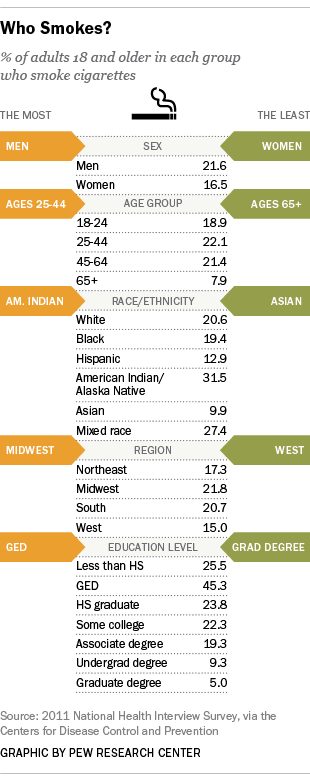 Drugstore chain CVS has received a lot of attention, most of it positive, for its decision to stop selling cigarettes and other tobacco products by Oct. 1. The company expects to lose $2 billion in sales to tobacco shoppers, though it says it’s identified unspecified “incremental opportunities that are expected to offset the profitability impact.” It’s worth noting, though, that CVS is leaving a shrinking business: Not only do fewer Americans smoke, but those who still do are smoking less.
Drugstore chain CVS has received a lot of attention, most of it positive, for its decision to stop selling cigarettes and other tobacco products by Oct. 1. The company expects to lose $2 billion in sales to tobacco shoppers, though it says it’s identified unspecified “incremental opportunities that are expected to offset the profitability impact.” It’s worth noting, though, that CVS is leaving a shrinking business: Not only do fewer Americans smoke, but those who still do are smoking less.
In 2011, 19% of adult Americans, or 43.8 million, were current cigarette smokers, according to the Centers for Disease Control and Prevention’s most recent National Health Interview Survey. Those figures are down from 22.3% (or 45.8 million) in 2002, though smoking prevalence has hovered around 20% for the past several years. By contrast, in 1965 — a year after the first Surgeon General’s report on smoking and health — 41.9% of U.S. adults smoked. As recently as 1979, fully a third did so.
Smoking rates today are highest among the poor and less-educated, according to government data. For instance, 29% of people living below the official poverty level smoke, versus 17.9% of people at or above poverty. People whose highest educational level is a General Educational Development (GED) certificate — typically high-school dropouts — are nine times more likely to smoke than people with graduate degrees (45.3% versus 5%).
Smoking rates vary considerably by geography. The highest rates in the 2009-2011 period were in nonurban counties in the South (31.9%) and small towns in the South (31%) and Midwest (30%). The lowest rates are in big Western cities (15%) and their suburban fringes (16.9%).
American smokers aren’t lighting up the way they used to. In 1980, according to data compiled by the Institute for Health Metrics and Evaluation, U.S. smokers consumed an average 12,000 cigarettes — more than a pack and a half a day. By 2012, per-smoker consumption had fallen to 8,200 cigarettes, or just over a pack a day.
CVS hopes that exiting the tobacco business will aid its efforts to recast itself as not just a drugstore but a healthcare provider, especially since Americans don’t generally associate smoking and health. In a Pew Research Center survey last year, 53% called cigarette smoking an “extremely” or “very” serious public health problem; 45% said the country was making progress in addressing the issue of smoking, while 13% said it was losing ground.



